Please fill out the following information, and RRFC Admissions will contact you to discuss our program offerings:
Issue #63
by L. Swift and Jeff McQ


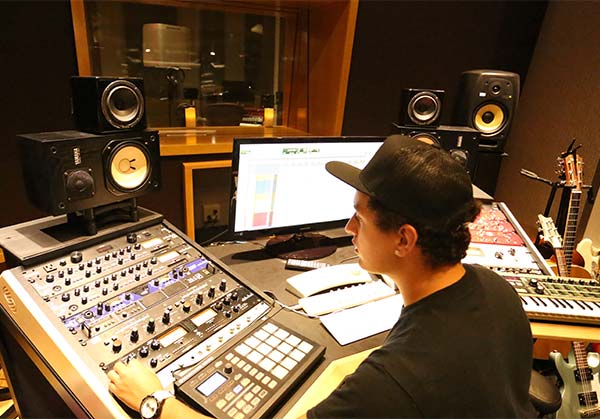 “The only way to make it is to do it 100 percent.”
Wise words from a guy who knows firsthand. Not long after completing his apprenticeship with mentor Dave Mikeal at StudioLive USA in Orlando, Florida, Recording Connection graduate Sebastian Lefeld relocated to Miami and jumped into the industry with both feet. Within 6 months of graduating, not only had he worked with the likes of Carlos Santana, but his dedication and work ethic had landed him a full-time position at one of Miami’s top studios!
As early as his second year in high school, Sebastian knew he wanted to work in audio engineering and began scoping out schools, including Full Sail in the Orlando area, and a number of others. He ultimately decided on the Recording Connection because of the hands-on experience that apprenticeship training offers.
“I really liked the fact that they put you to work while you’re learning,” he says. “I have a lot of friends that are in Full Sail, and they got experience, but it was still in the classroom. So now, when they are starting to intern at studios and all that, they really don’t know the dynamics of the business side of the studio, which I think is super important…My mentor, Dave Mikeal, he helped me out not just with like the audio parts, but also with how to run a studio: what it would take to pay the studio rent, how much energy a studio uses… It’s good to know everything, in case you want to build your own studio someday.”
Sebastian also mentions that apprenticing in the studio basically made him responsible for what he was learning. “Even though you have a mentor and everything, 90 percent of what you learn is up to you,” he says. “I really like that, because that’s how the real world is. Nobody is going to hand you anything.”
As for the “real world,” Sebastian says his time working with Dave was a wake-up call that put his work ethic into high gear. “I used to think that people come into the studio and it’s like a party,” says Sebastian. “No, it’s crazy…It’s all about how efficiently and how fast you can work, because when they say time is money, they are not joking. Time is money. These people are paying a lot of money to be there, so they want everything done super quick, and you have to be able to do it on the fly.”
“The only way to make it is to do it 100 percent.”
Wise words from a guy who knows firsthand. Not long after completing his apprenticeship with mentor Dave Mikeal at StudioLive USA in Orlando, Florida, Recording Connection graduate Sebastian Lefeld relocated to Miami and jumped into the industry with both feet. Within 6 months of graduating, not only had he worked with the likes of Carlos Santana, but his dedication and work ethic had landed him a full-time position at one of Miami’s top studios!
As early as his second year in high school, Sebastian knew he wanted to work in audio engineering and began scoping out schools, including Full Sail in the Orlando area, and a number of others. He ultimately decided on the Recording Connection because of the hands-on experience that apprenticeship training offers.
“I really liked the fact that they put you to work while you’re learning,” he says. “I have a lot of friends that are in Full Sail, and they got experience, but it was still in the classroom. So now, when they are starting to intern at studios and all that, they really don’t know the dynamics of the business side of the studio, which I think is super important…My mentor, Dave Mikeal, he helped me out not just with like the audio parts, but also with how to run a studio: what it would take to pay the studio rent, how much energy a studio uses… It’s good to know everything, in case you want to build your own studio someday.”
Sebastian also mentions that apprenticing in the studio basically made him responsible for what he was learning. “Even though you have a mentor and everything, 90 percent of what you learn is up to you,” he says. “I really like that, because that’s how the real world is. Nobody is going to hand you anything.”
As for the “real world,” Sebastian says his time working with Dave was a wake-up call that put his work ethic into high gear. “I used to think that people come into the studio and it’s like a party,” says Sebastian. “No, it’s crazy…It’s all about how efficiently and how fast you can work, because when they say time is money, they are not joking. Time is money. These people are paying a lot of money to be there, so they want everything done super quick, and you have to be able to do it on the fly.”
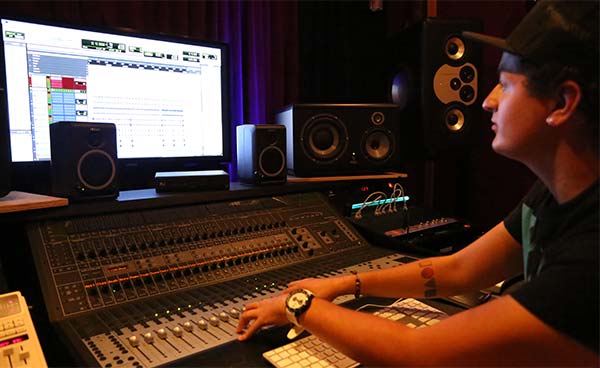 After finishing up his apprenticeship, Sebastian decided he wanted to try his hand in a bigger city, so he relocated to Miami, Florida. From his experiences on-the-job with Dave Mikeal, he realized his best chance for getting his foot in the door was to take whatever opportunities he could get, paid or unpaid. He accepted an unpaid opportunity to work with Big Wall Studios (Freddy Vindver & John D. Thomas) and Miami Studio City District (John D. Thomas), and began working there 3-4 days a week while waiting tables on the side.
Within a couple of months, Sebastian’s efforts landed him a real opportunity to prove himself: a chance to assist on a project for music industry icon Carlos Santana, who brought his act into the studio to rehearse for a major tour. “There always has to be an in-house engineer in every session,” says Sebastian, “so that was me right there, when they needed help with the patch bay or when they needed to find a connection, get different cables or whatever.”
Sebastian describes meeting Carlos Santana as a surreal experience. “I was looking with his engineer at the new SSL 500, the Live console,” he says. “I kind of felt somebody like brush me on my shoulder, so I turned around and it was Santana, and I was like, ‘Oh, man! I’m in the same room with a guy that I have been listening to since I was born.'”
That was a Friday. The following Monday, John D. Thomas, one of the studio owners, called him in and sat him down. Sebastian recalls what happened:
After finishing up his apprenticeship, Sebastian decided he wanted to try his hand in a bigger city, so he relocated to Miami, Florida. From his experiences on-the-job with Dave Mikeal, he realized his best chance for getting his foot in the door was to take whatever opportunities he could get, paid or unpaid. He accepted an unpaid opportunity to work with Big Wall Studios (Freddy Vindver & John D. Thomas) and Miami Studio City District (John D. Thomas), and began working there 3-4 days a week while waiting tables on the side.
Within a couple of months, Sebastian’s efforts landed him a real opportunity to prove himself: a chance to assist on a project for music industry icon Carlos Santana, who brought his act into the studio to rehearse for a major tour. “There always has to be an in-house engineer in every session,” says Sebastian, “so that was me right there, when they needed help with the patch bay or when they needed to find a connection, get different cables or whatever.”
Sebastian describes meeting Carlos Santana as a surreal experience. “I was looking with his engineer at the new SSL 500, the Live console,” he says. “I kind of felt somebody like brush me on my shoulder, so I turned around and it was Santana, and I was like, ‘Oh, man! I’m in the same room with a guy that I have been listening to since I was born.'”
That was a Friday. The following Monday, John D. Thomas, one of the studio owners, called him in and sat him down. Sebastian recalls what happened:
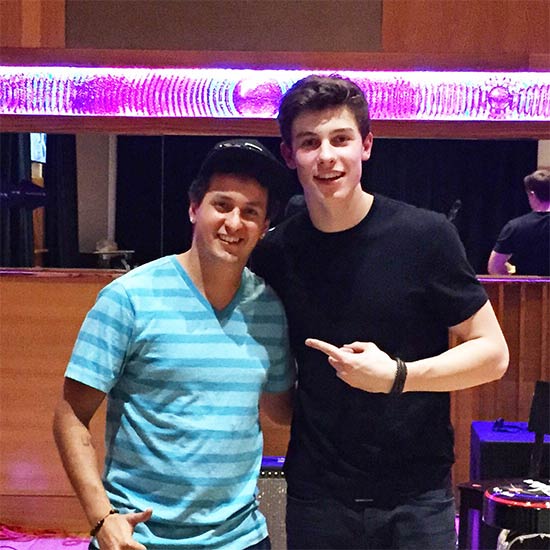 “He was like, ‘Listen man, we are a good fit. If you want the full-time position, it’s yours.’ And the day after, I went into Outback [Steakhouse] where I used to work, and I said, ‘Look you guys, I’m done.'”
Sebastian hasn’t looked back since. Now working full-time in one of Miami’s most active studios, he’s able to be part of the action on everything, from developing smartphone ringtones to working with clients like Ricky Martin, Chayanne, Don Henley, Shawn Mendes and Jencarlos Canela, to name just a few.
But even so, he hasn’t forgotten the dedication and the work ethic that helped land him the job in the first place—nor does he forget the competitive nature of the business he’s in.
“If I could say one thing to somebody that’s thinking about getting into the industry,” he says, “it would be definitely get ready for long hours and a lot of days. I’m here at least six days a week, sometimes seven, and it’s never less than 10-11 hours. But if you’re going to get into this industry, it’s because you love it. When I used to work at a restaurant, 2 hours could feel like 10 hours but 10 hours in the studio feels like nothing…Time goes by quickly when you’re having fun.
“Whenever I take a break,” Sebastian adds, “I’m always thinking there’s someone else out there who’s doing what I do who’s not taking a break, and I get back to work.”
Hear work by Sebastian in our Apprentice Media section below!
“He was like, ‘Listen man, we are a good fit. If you want the full-time position, it’s yours.’ And the day after, I went into Outback [Steakhouse] where I used to work, and I said, ‘Look you guys, I’m done.'”
Sebastian hasn’t looked back since. Now working full-time in one of Miami’s most active studios, he’s able to be part of the action on everything, from developing smartphone ringtones to working with clients like Ricky Martin, Chayanne, Don Henley, Shawn Mendes and Jencarlos Canela, to name just a few.
But even so, he hasn’t forgotten the dedication and the work ethic that helped land him the job in the first place—nor does he forget the competitive nature of the business he’s in.
“If I could say one thing to somebody that’s thinking about getting into the industry,” he says, “it would be definitely get ready for long hours and a lot of days. I’m here at least six days a week, sometimes seven, and it’s never less than 10-11 hours. But if you’re going to get into this industry, it’s because you love it. When I used to work at a restaurant, 2 hours could feel like 10 hours but 10 hours in the studio feels like nothing…Time goes by quickly when you’re having fun.
“Whenever I take a break,” Sebastian adds, “I’m always thinking there’s someone else out there who’s doing what I do who’s not taking a break, and I get back to work.”
Hear work by Sebastian in our Apprentice Media section below!
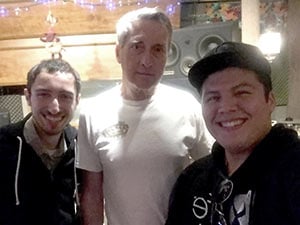 Felix Nieto, apprentice with legendary producer/engineer Don Zientara, had his old pal Austin Ellis (from The Voice) into Inner Ear Studio to lay down a few tracks! Speaking of the experience, Felix says, “Back in the day, we used to do a couple of projects together. And so I helped him, he helped me and, you know, we definitely both got a lot better at our trade and here we are.”
Felix Nieto, apprentice with legendary producer/engineer Don Zientara, had his old pal Austin Ellis (from The Voice) into Inner Ear Studio to lay down a few tracks! Speaking of the experience, Felix says, “Back in the day, we used to do a couple of projects together. And so I helped him, he helped me and, you know, we definitely both got a lot better at our trade and here we are.”
 After his very first lesson with Recording mentor Hollis Greathouse at Audible Images (Pittsburgh, PA), apprentice Nick Dawson joined Hollis in the control room to record 15-year-old singer Gabby Barrett! Nick loved seeing how Hollis connected and worked with the young artist to get the best from her, saying, “I guess the Grammy he won isn’t for nothing.”
After his very first lesson with Recording mentor Hollis Greathouse at Audible Images (Pittsburgh, PA), apprentice Nick Dawson joined Hollis in the control room to record 15-year-old singer Gabby Barrett! Nick loved seeing how Hollis connected and worked with the young artist to get the best from her, saying, “I guess the Grammy he won isn’t for nothing.”
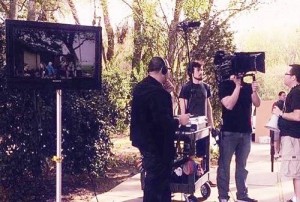 Mario Fernandez, Film Connection apprentice in Modesto, CA is working on a promotional video for Camp Taylor, a camp that helps children with heart disease live better, happier lives. Way to go Mario!
Mario Fernandez, Film Connection apprentice in Modesto, CA is working on a promotional video for Camp Taylor, a camp that helps children with heart disease live better, happier lives. Way to go Mario!
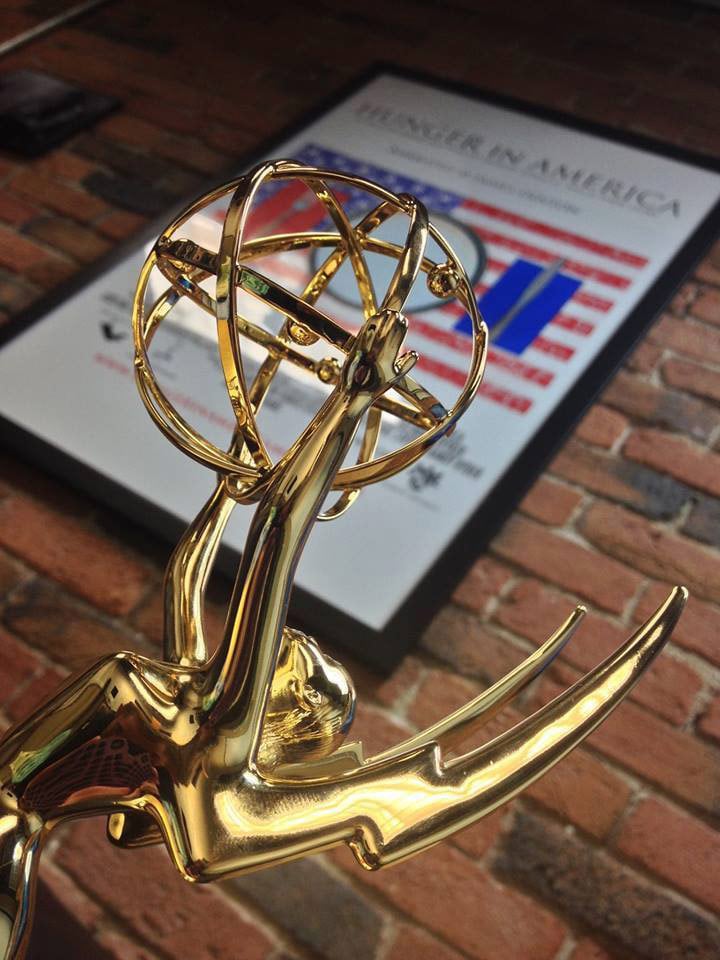 Film Connection mentor Zac Adams is a busy guy, to say the least. His production company, Skydive Films in Nashville, TN, maintains a constant slate of projects ranging from music videos to commercial work to short films. But beyond that, Zac has been building a well-deserved reputation for making documentary films of substance that get people’s attention. His recent documentary Hunger In America won a Mid-South Emmy award, while his follow-up Autism In America (narrated by Grey’s Anatomy star Chandra Wilson) is slated for release in a matter of weeks—and another documentary about post-traumatic stress syndrome (PTSD) is slated for production soon, with narration by Billy Bob Thornton!
Through all of this, Zac is happy to pass his skills and business know-how with Film Connection apprentices, involving them heavily in this various projects. In the interview below, Zac shares more about what’s on his plate and how his apprentices are involved, and also offers some key insights about balancing the demands of the business of film with producing work that has meaning and social benefit. Enjoy!
Film Connection mentor Zac Adams is a busy guy, to say the least. His production company, Skydive Films in Nashville, TN, maintains a constant slate of projects ranging from music videos to commercial work to short films. But beyond that, Zac has been building a well-deserved reputation for making documentary films of substance that get people’s attention. His recent documentary Hunger In America won a Mid-South Emmy award, while his follow-up Autism In America (narrated by Grey’s Anatomy star Chandra Wilson) is slated for release in a matter of weeks—and another documentary about post-traumatic stress syndrome (PTSD) is slated for production soon, with narration by Billy Bob Thornton!
Through all of this, Zac is happy to pass his skills and business know-how with Film Connection apprentices, involving them heavily in this various projects. In the interview below, Zac shares more about what’s on his plate and how his apprentices are involved, and also offers some key insights about balancing the demands of the business of film with producing work that has meaning and social benefit. Enjoy!

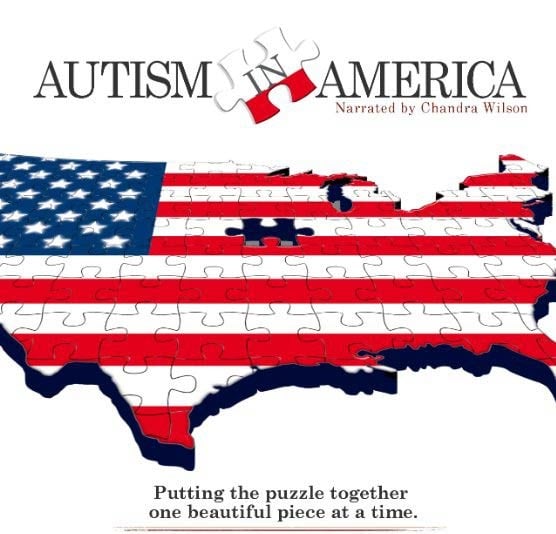 RRFC: What do you think is the biggest misconception with autism?
Zac: That everyone is like Rain Man. That everyone is this savant, and you drop a box of toothpicks and within two seconds he could tell you how many are on the floor. It’s interesting—we actually interviewed the real life Rain Man, Joe [Sullivan]… there are two or three people that were the inspiration, I think Joe was the only one living…He’s about, yeah early 50s, maybe mid-50s now, and his mom is in it. She’s 91, she’s like a pioneer for autism and autism awareness, so it’s good to have them in the film as well…One of the reasons we’re making this film is to educate people and show them it exists and talk about the different misconceptions, and the fact that it’s now one in every 53 babies that are born, I believe, have some sort of autism, but there’s so many different spectrums.
RRFC: You won an Emmy for Hunger in America, correct?
Zac: Yeah, we won a Mid-South Emmy back in late January…We have a couple of different distributors—one’s in San Francisco, and other one’s out in Los Angeles. So they’re taking it to schools and libraries and showing all over the place. Food banks have been picking it up. And hopefully it’ll be on some sort of TV in the fall.
RRFC: What was the inspiration behind Hunger in America, and what made you want to do a documentary on it?
Zac: Well, I think the fact that no one was talking about it. I knew a little bit of it because my dad’s on the board of a non-profit called Feed America First. [I] was talking to those guys and went to their website and saw some of these stats, and almost didn’t believe them at first, that this is happening in the world’s richest country. And then did some more research, and found out that it is. But it’s a different type of hunger. It’s not what you see in Ethiopia. It’s not where people are starving on the streets, their stomachs are puffed out. It’s almost like a secret epidemic.
RRFC: When you are thinking about making a documentary, do you make something that’s important to you, or do you try to stay with what the current market trends are?
RRFC: What do you think is the biggest misconception with autism?
Zac: That everyone is like Rain Man. That everyone is this savant, and you drop a box of toothpicks and within two seconds he could tell you how many are on the floor. It’s interesting—we actually interviewed the real life Rain Man, Joe [Sullivan]… there are two or three people that were the inspiration, I think Joe was the only one living…He’s about, yeah early 50s, maybe mid-50s now, and his mom is in it. She’s 91, she’s like a pioneer for autism and autism awareness, so it’s good to have them in the film as well…One of the reasons we’re making this film is to educate people and show them it exists and talk about the different misconceptions, and the fact that it’s now one in every 53 babies that are born, I believe, have some sort of autism, but there’s so many different spectrums.
RRFC: You won an Emmy for Hunger in America, correct?
Zac: Yeah, we won a Mid-South Emmy back in late January…We have a couple of different distributors—one’s in San Francisco, and other one’s out in Los Angeles. So they’re taking it to schools and libraries and showing all over the place. Food banks have been picking it up. And hopefully it’ll be on some sort of TV in the fall.
RRFC: What was the inspiration behind Hunger in America, and what made you want to do a documentary on it?
Zac: Well, I think the fact that no one was talking about it. I knew a little bit of it because my dad’s on the board of a non-profit called Feed America First. [I] was talking to those guys and went to their website and saw some of these stats, and almost didn’t believe them at first, that this is happening in the world’s richest country. And then did some more research, and found out that it is. But it’s a different type of hunger. It’s not what you see in Ethiopia. It’s not where people are starving on the streets, their stomachs are puffed out. It’s almost like a secret epidemic.
RRFC: When you are thinking about making a documentary, do you make something that’s important to you, or do you try to stay with what the current market trends are?
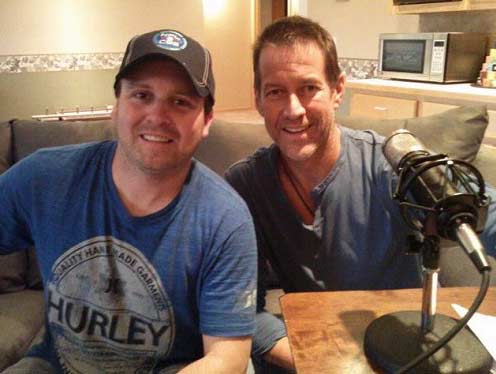 Zac: A little bit of both. There’s a reason it’s called film business. If it wasn’t a business, it would just be a very expensive and time-consuming hobby…Unless you’re so independently wealthy that you can just make it for yourself or whatever, you have to have some target audience. You have to have a business plan. You have to say, “Who wants to see this and why? What’s the market? What’s the audience?” Otherwise who’s going to put money into your film?…But then with these topics, I go into a project where a lot of times I don’t know much about the subject, but as a filmmaker, I learn. So I learned a lot about the hunger crisis while making the film. I knew very little about autism except what I saw in Rain Man. You know what I mean?
RRFC: What other projects do you have coming up?
Zac: Our new film’s called Iron Will. It’s [a documentary] about PTSD—it’s on my website. I’ve got my two apprentices working on that. They also worked Autism in America, Jamie Reed and Matthew Gibson. Matthew’s brand new—Jamie’s been with me since early September, late August…We’ll be spending the next year filming that and post production, and I’m a producer and writer on that. I’m not the director—I didn’t want to direct that one because my editor, one of my main editors named Sergio, he has bad PTSD, but he’s a brilliant filmmaker. This is like his directorial debut for a feature film, so I wanted him to do that….We’ve already filmed five interviews. Jamie Reed was a part of that. He did sound on all five interviews, so he’ll have an IMDB credit.
RRFC: Has it been nice having your apprentices with you?
Zac: Yeah it has…they’re both aspiring filmmakers, so what we do is bring them on set, teach them about lighting, cinematography. They both have done sound. I actually had them both film some B-roll for Autism in America and it made the cut, which is cool. They also assisted with some of the editing, because I said if you’re going to be directing your own films, whether it’s documentary, feature, narrator, [it] doesn’t matter, you’re gonna work really close with the editor. So I bring them in and we watch it, what works and what doesn’t work. And it helps me a lot too, because I’ve seen the darn thing eight billion times, [and] so has my editor, so it’s good to bring in people that haven’t seen it, and get their honest feedback.
Zac: A little bit of both. There’s a reason it’s called film business. If it wasn’t a business, it would just be a very expensive and time-consuming hobby…Unless you’re so independently wealthy that you can just make it for yourself or whatever, you have to have some target audience. You have to have a business plan. You have to say, “Who wants to see this and why? What’s the market? What’s the audience?” Otherwise who’s going to put money into your film?…But then with these topics, I go into a project where a lot of times I don’t know much about the subject, but as a filmmaker, I learn. So I learned a lot about the hunger crisis while making the film. I knew very little about autism except what I saw in Rain Man. You know what I mean?
RRFC: What other projects do you have coming up?
Zac: Our new film’s called Iron Will. It’s [a documentary] about PTSD—it’s on my website. I’ve got my two apprentices working on that. They also worked Autism in America, Jamie Reed and Matthew Gibson. Matthew’s brand new—Jamie’s been with me since early September, late August…We’ll be spending the next year filming that and post production, and I’m a producer and writer on that. I’m not the director—I didn’t want to direct that one because my editor, one of my main editors named Sergio, he has bad PTSD, but he’s a brilliant filmmaker. This is like his directorial debut for a feature film, so I wanted him to do that….We’ve already filmed five interviews. Jamie Reed was a part of that. He did sound on all five interviews, so he’ll have an IMDB credit.
RRFC: Has it been nice having your apprentices with you?
Zac: Yeah it has…they’re both aspiring filmmakers, so what we do is bring them on set, teach them about lighting, cinematography. They both have done sound. I actually had them both film some B-roll for Autism in America and it made the cut, which is cool. They also assisted with some of the editing, because I said if you’re going to be directing your own films, whether it’s documentary, feature, narrator, [it] doesn’t matter, you’re gonna work really close with the editor. So I bring them in and we watch it, what works and what doesn’t work. And it helps me a lot too, because I’ve seen the darn thing eight billion times, [and] so has my editor, so it’s good to bring in people that haven’t seen it, and get their honest feedback.
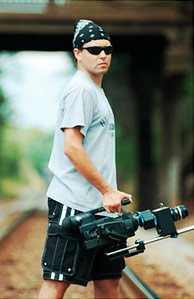 RRFC: So how do you balance all this out? Making projects and also being a mentor as well?
Zac: Well, I think being busy helps you as a mentor, because you’re always looking for extra help… I mean Jamie’s resume is gonna be pretty big when he’s done in a few months, because he’s done everything from music videos to corporate, to feature documentaries…We start them off low on the totem pole—you don’t start off filming day one. They start off watching, and [we tell them], “Hey, go see how they do lights. I’m gonna show you how to turn the lights on and off”…just real basic stuff starting up, and then they can prove to me that they can grow and move up, then we give them more responsibility for each project.
RRFC: That’s awesome. You’ve got some really cool stuff going on.
Zac: Well, we try. You’re only as good as your last project. You can never be content, because you don’t know when the phone’s gonna start ringing. I still tell the guys, “You have to have a business attitude.” That’s why I give them assignments, as well: “Okay, I want to have you make a two-minute documentary. I’m gonna have you do your own music video. I’m gonna have you do wedding or corporate project, so when you graduate, these are things you can do to make money as you’re trying to raise money for [your] 100 million dollar narrative film. Because otherwise, you’re still gonna be working wherever you were, nine-to-five when you bought this equipment, and [you] need to be using it to make money.”
RRFC: So how do you balance all this out? Making projects and also being a mentor as well?
Zac: Well, I think being busy helps you as a mentor, because you’re always looking for extra help… I mean Jamie’s resume is gonna be pretty big when he’s done in a few months, because he’s done everything from music videos to corporate, to feature documentaries…We start them off low on the totem pole—you don’t start off filming day one. They start off watching, and [we tell them], “Hey, go see how they do lights. I’m gonna show you how to turn the lights on and off”…just real basic stuff starting up, and then they can prove to me that they can grow and move up, then we give them more responsibility for each project.
RRFC: That’s awesome. You’ve got some really cool stuff going on.
Zac: Well, we try. You’re only as good as your last project. You can never be content, because you don’t know when the phone’s gonna start ringing. I still tell the guys, “You have to have a business attitude.” That’s why I give them assignments, as well: “Okay, I want to have you make a two-minute documentary. I’m gonna have you do your own music video. I’m gonna have you do wedding or corporate project, so when you graduate, these are things you can do to make money as you’re trying to raise money for [your] 100 million dollar narrative film. Because otherwise, you’re still gonna be working wherever you were, nine-to-five when you bought this equipment, and [you] need to be using it to make money.”
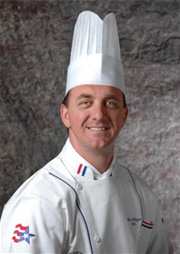 “I went to the culinary institute of America in Hyde Park but learned just as much during my externship at the Four Seasons Hotel in Newport Beach.
“As an executive chef I used to throw away resumes from kids dumb enough to blow 65k to attend The Art Institute and Le Cordon Bleu because they had no experience and prima donna attitudes. Cooking in the trenches of a real cutting edge kitchen is the only way to go.
“Students’ lack of experience, in fact zero experience after graduation and accumulated debt are what’s wrong with the culinary school system of today. Le Cordon Bleu charges 65k for 2 years of playing house! Conventional culinary school’s training is for suckers. Culinary schools are for profit and proud of it!”
— Martin Gilligan CEC, MCFE, American Culinary Federation’s ‘Chef of the Year 2005’ Los Angeles, CA
“I went to the culinary institute of America in Hyde Park but learned just as much during my externship at the Four Seasons Hotel in Newport Beach.
“As an executive chef I used to throw away resumes from kids dumb enough to blow 65k to attend The Art Institute and Le Cordon Bleu because they had no experience and prima donna attitudes. Cooking in the trenches of a real cutting edge kitchen is the only way to go.
“Students’ lack of experience, in fact zero experience after graduation and accumulated debt are what’s wrong with the culinary school system of today. Le Cordon Bleu charges 65k for 2 years of playing house! Conventional culinary school’s training is for suckers. Culinary schools are for profit and proud of it!”
— Martin Gilligan CEC, MCFE, American Culinary Federation’s ‘Chef of the Year 2005’ Los Angeles, CA
 This week, Brian continued his visit in Nashville, Tennessee, AKA “Music City,” to meet and formalize relationships between RRFC and local professionals as part of our Master’s Mentor program. Last week we told you how multi-award-winning engineer, producer and educator Bob Bullock has joined up with the Master’s Mentor program. Well, the hits just keep on coming! Following closely on the heels of Bob coming on board, we are pleased to announce that GRAMMY®-winning engineer, producer and musician Nick Raskulinecz is the latest talented professional to join our Masters Mentor program.
Nick who? Well, the name might not roll right off your tongue, but this guy has a discography that reads like a Who’s-Who of modern rock. Nick has a rich history that began as he worked as an apprentice at the legendary Sound City in Los Angeles. Shortly after leaving there in 2001, he was invited by Dave Grohl (whom he met engineering the Foo Fighters track “A320” for Godzilla: The Album) to make his debut as record producer with the Foo Fighters’ next album, One by One. The experience was successful, and Raskulinecz returned for the follow-up, In Your Honor (2005). He has also mixed the audio on the Foo Fighters live DVD releases Everywhere but Home and Foo Fighters Live at Wembley Stadium, as well as the album Skin and Bones, which was accompanied by the live DVD At Hyde Park, also mixed by Raskulinecz.
In addition to his work with Foo Fighters, he has worked with such artists as Ghost, We As Human, Evanescence, Marilyn Manson, Deftones, Coheed and Cambria, Stone Sour, Trivium, Duff McKagan, Mondo Generator, Danzig, The Exies, Ash, My Ruin, Velvet Revolver, Rush, Mastodon, Shadows Fall, Superdrag, Goatsnake, Fireball Ministry, Rye Coalition, Death Angel, Danko Jones and Apocalyptica, to name a few.
“When we first pulled up to Nick’s Rock Falcon Studio, just outside Nashville, I had no idea that so much amazing music that I was familiar with had come out of this studio, out in the country and in the middle of nowhere!” stated Brian Kraft. “But after hanging with Nick and hearing how he likes to work, his immense passion for getting the most out of his artists and ending up with a record that stands the test of time, it made total sense to me. Such a peaceful, creative environment with no distractions. What a great place to work.”
Stay tuned next week for more on the Nashville trip!
This week, Brian continued his visit in Nashville, Tennessee, AKA “Music City,” to meet and formalize relationships between RRFC and local professionals as part of our Master’s Mentor program. Last week we told you how multi-award-winning engineer, producer and educator Bob Bullock has joined up with the Master’s Mentor program. Well, the hits just keep on coming! Following closely on the heels of Bob coming on board, we are pleased to announce that GRAMMY®-winning engineer, producer and musician Nick Raskulinecz is the latest talented professional to join our Masters Mentor program.
Nick who? Well, the name might not roll right off your tongue, but this guy has a discography that reads like a Who’s-Who of modern rock. Nick has a rich history that began as he worked as an apprentice at the legendary Sound City in Los Angeles. Shortly after leaving there in 2001, he was invited by Dave Grohl (whom he met engineering the Foo Fighters track “A320” for Godzilla: The Album) to make his debut as record producer with the Foo Fighters’ next album, One by One. The experience was successful, and Raskulinecz returned for the follow-up, In Your Honor (2005). He has also mixed the audio on the Foo Fighters live DVD releases Everywhere but Home and Foo Fighters Live at Wembley Stadium, as well as the album Skin and Bones, which was accompanied by the live DVD At Hyde Park, also mixed by Raskulinecz.
In addition to his work with Foo Fighters, he has worked with such artists as Ghost, We As Human, Evanescence, Marilyn Manson, Deftones, Coheed and Cambria, Stone Sour, Trivium, Duff McKagan, Mondo Generator, Danzig, The Exies, Ash, My Ruin, Velvet Revolver, Rush, Mastodon, Shadows Fall, Superdrag, Goatsnake, Fireball Ministry, Rye Coalition, Death Angel, Danko Jones and Apocalyptica, to name a few.
“When we first pulled up to Nick’s Rock Falcon Studio, just outside Nashville, I had no idea that so much amazing music that I was familiar with had come out of this studio, out in the country and in the middle of nowhere!” stated Brian Kraft. “But after hanging with Nick and hearing how he likes to work, his immense passion for getting the most out of his artists and ending up with a record that stands the test of time, it made total sense to me. Such a peaceful, creative environment with no distractions. What a great place to work.”
Stay tuned next week for more on the Nashville trip! 
RRFC is education upgraded for the 21st century.
Get the latest career advice, insider production tips, and more!
Please fill out the following information, and RRFC Admissions will contact you to discuss our program offerings:
Stay in the Loop: Subscribe for RRFC news & updates!
© 2025 Recording Radio Film Connection & CASA Schools. All Rights Reserved.



